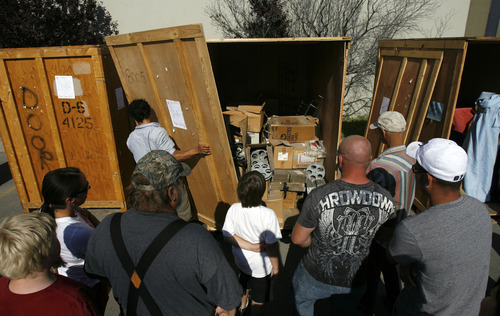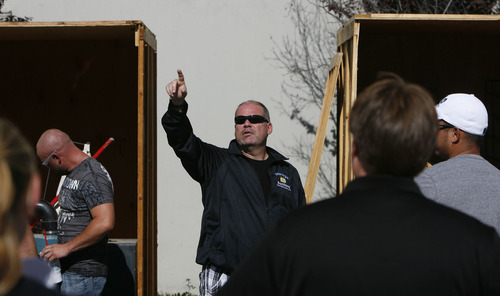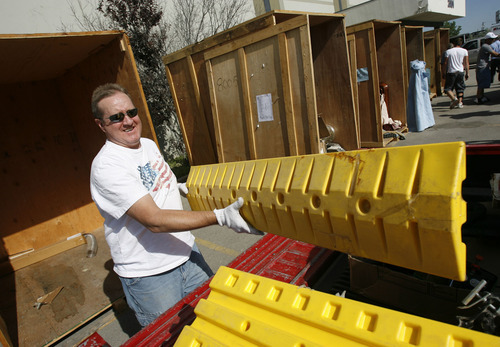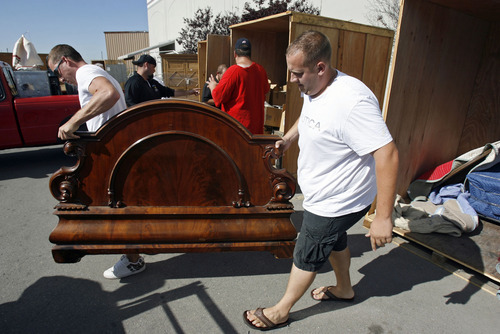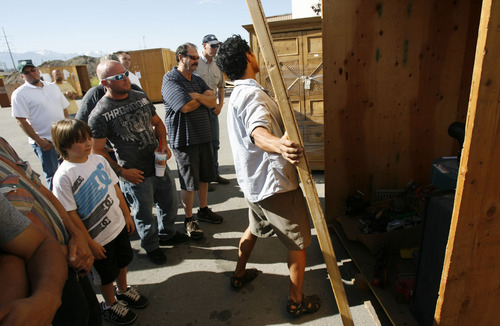This is an archived article that was published on sltrib.com in 2011, and information in the article may be outdated. It is provided only for personal research purposes and may not be reprinted.
Utahns are catching storage unit auction fever.
And for many, the ailment's origin can be traced to two reality TV shows, A&E's "Storage Wars" and Spike TV's "Auction Hunters."
The shows follow the exploits of modern-day treasure hunters who are cashing in by bidding on and buying abandoned storage units in hopes of finding forgotten gold. The phenomenon has proved so popular that attendance at storage unit auctions in Utah is up several-fold since the shows first aired, as hopeful bidders dream of duplicating the success they've seen on television.
"Just a few years ago you might have had a dozen or so people show up to bid. At times they would be grabbing units for $25, maybe $50," said J.R. Jackson, a veteran Utah auctioneer. "Now, it isn't unusual to see crowds of 200, sometimes 300 people, and the bids are a lot higher."
Standing in front of a crowd of several dozen bidders at A-1 Pioneer Moving and Storage in Salt Lake City two weeks ago, Jackson stepped aside for a few minutes as an A-1 employee used a hammer to open the first of six containers that were to be auctioned that day.
He gave the potential buyers five to 10 minutes to glance inside. There was no touching the items, and no looking inside individual boxes. "Are you ready?"Jackson finally asked, and the bidding began. "I've got $50 here. Now $75, now $100. Now I've got $150. How about $200?"
The container of 18 cardboard boxes full of books and old vinyl-record albums sold for $260. The second container, a more-promising looking unit with several fishing poles up front, was purchased by Kameron Rollins of Provo for $370.
"I'm pretty sure the fishing poles are antiques," said Rollins, explaining that he has been attending storage unit auctions for the past four years, well before the TV-sparked craze began. "And there looks to be some pretty nice furniture here. I think I'll make some money on this one."
In all, the six storage containers sold for $2,380.
Allen Haff and Ton Jones, who star in "Auction Hunters," understand the lure and thrill of uncovering valuable merchandise in abandoned units. Their show, now in its second season, says up front that it highlights some of their biggest discoveries.
Yet when they talk about the behind-the-scenes aspects of their business, it isn't the valuables they discovered or the unexpected treasures they found wrapped in newspaper and tucked away in some dusty corner that top the list. Instead, they talk about the years of hard work they put in learning their craft.
"Both of us went for years getting our butts kicked while we learned the business," Haff said. "And now we are very good at what we do. You could dump us in the middle of Salt Lake City (at a storage unit auction) and we'd do just fine."
Still, it is a tough business, colleague Jones said.
About 80 percent of the units they buy are "just OK," with the remainder generating most of their profits. "What a lot of the new people who get into this business don't realize is that it is easy to go broke" if they're not paying the correct amount for the units they buy, he said.
And behind the glamour and glitz on the TV screen, Jones said, there is a lot of "low end" work involved — yard sales, swap meets and online marketing that has to be arranged. "The key to this business is moving product."
Although Jones concedes shows such as theirs have made the industry more competitive by bringing attention to the scene, he also attributes increased interest to the tough economic times that have led many to seek their fortunes in the business, even as others leave their goods behind in abandoned units.
Haff said, though, that it isn't the new bidders who concern them.
The people they fret about showing up are antique dealers and those who handle estate sales. Such bidders know better than many how to properly put a value on the merchandise found inside abandoned storage rooms, Haff said. "Those are the guys who scare me."
Utahn Drew Wendt, who said he has been bidding on abandoned units for decades, agreed that it is a tough way to make a living.
"You've got to go in there and pull everything out and separate what you want and don't want," he said. "Then you have to haul what you don't want off to the dump and figure out what the stuff that's left is worth. Then you have to sell it, so most of the time you're working some pretty long hours for not a lot of money."
Wendt, though, said he seen people walk away with a storage room full of merchandise for $30 that turns out to be worth $6,000.
"There are a few people making a living at it, but not a lot," said Wendt, who left the auction at A-1 without bidding on a unit. "I didn't see anything I wanted."
That wasn't the case for Gary Gilgen, who won the bidding on the last of the six containers. He paid $340 for several boxes of tools and a construction site-dust collection system. "I used to do this years ago and just started back up since the shows came on television. This unit was the only one I could see that had anything of value in it."
A-1 Pioneer President and CEO Douglas Bradley said the reality shows have helped increase the prices he gets for the units that are put up for auction, but that the money still rarely covers his costs.
"Unfortunately, people pass on or sometimes lose their jobs and just can't come up with the money to cover the cost of their units. I'll usually wait until someone is $1,000 to $2,000 in arrears, and if I haven't heard from them, then I'll put [the unit] up for auction," he said.
A&E's "Storage Wars," like "Auction Hunters," shows off on TV the big discoveries made by its stars. But it also shows when they strike out and end up buying storage rooms full of junk.
Dave Hester, one of the stars of the show that begins its second season later this month, has been in the business for 25 years and recommends that those who want to follow him be ready for a big learning curve. "New people make a lot of mistakes," he said.
He, too, acknowledges that competition for units has increased but insists that isn't a big concern. "Even when I got into this business 25 years ago, people were talking about the good old days," Hester said. "And if someone comes out and outbids me, well God bless them."
He understands the lure.
"With our show, someone can be sitting on their couch watching us one day and the next they can be out doing exactly what we're doing — bidding on units," he said. "And anyone can get lucky. If you do" pick up a room for a couple hundred dollars and "find something that's worth several thousand, you're never going to want to punch a clock again."
steve@sltrib.comTwitter: @OberbeckBiz


